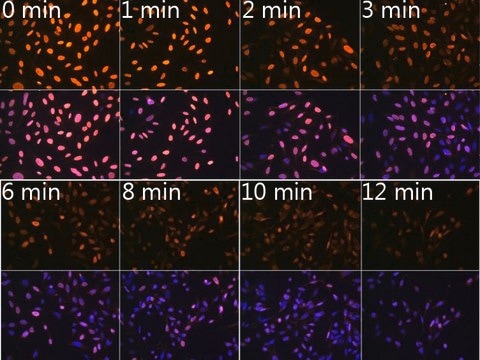MABE1006
Anti-N6-methyladenosine Antibody (m6A), clone 17-3-4-1
clone 17-3-4-1, from mouse
Synonym(s):
N6-methyladenosine, m6A
Sign Into View Organizational & Contract Pricing
All Photos(1)
About This Item
UNSPSC Code:
12352203
eCl@ss:
32160702
NACRES:
NA.41
Recommended Products
biological source
mouse
Quality Level
antibody form
purified antibody
antibody product type
primary antibodies
clone
17-3-4-1, monoclonal
species reactivity (predicted by homology)
all
technique(s)
RIP: suitable
dot blot: suitable
isotype
IgG1λ
shipped in
wet ice
target post-translational modification
unmodified
General description
N6-Methyladenosine (m6A ) is an abundant modification found in mRNA, tRNA, snRNA, as well as long non-coding RNA, in all species. RNA adenosine methylation is catalyzed by a multicomponent complex composed of METTL3/MT-A70, METTL14, and WTAP in mammals. METTL3 & METTL14 are responsible for the methyltransferase activity of the complex, and WTAP mediates substrate recruitment. Fat mass and obesity-associated (FTO) and ALKBH5 are two identified demethylases that catalyze oxidative demthylation of m6A. Several functions of m6A modification have been proposed, including mRNA decay, splicing regulation, RNA nuclear export and maturation. (PMID 25171402). Cat. No. MABE1006, Anti-N6-methyladenosine (m6A), clone 17-3-4-1, is a mouse monoclonal that specifically detects RNA molecules with m6A modication.
Immunogen
Epitope: N6-methyladenosine
Hapten N6-methyladenosine-5′-mono-phosphate conjugated to BSA of all N6-methyladenosine (m6A).
Application
(RNA) Immunoprecipitation Analysis: A representative lot immunoprecipitated N6-methyladenosine in IME2 transcripts (Bodi, Z., et al. (2010). Nucleic Acids Research. 38(16):5327-5335).
RNA Dot Blot Analysis: A representative lot detected N6-methyladenosine in m6A (Bodi, Z., et al. (2010). Nucleic Acids Research. 38(16):5327-5335).
RNA Dot Blot Analysis: A representative lot detected N6-methyladenosine in m6A (Bodi, Z., et al. (2010). Nucleic Acids Research. 38(16):5327-5335).
Anti-N6-methyladenosine Antibody (m6A), clone 17-3-4-1 is an antibody against N6-methyladenosine for use in Dot Blot and RNA binding protein immunoprecipitation.
Research Category
Epigenetics & Nuclear Function
Epigenetics & Nuclear Function
Research Sub Category
Nuclear Receptors
Nuclear Receptors
Quality
Evaluated by RNA Dot Blot in oligomers containing N6-methyladenosine.
RNA Dot Blot Analysis: 1.0-2.0 μg/mL of this antibody detected N6-methyladenosine in oligomers containing N6-methyladenosine.
RNA Dot Blot Analysis: 1.0-2.0 μg/mL of this antibody detected N6-methyladenosine in oligomers containing N6-methyladenosine.
Physical form
Format: Purified
Protein G Purified
Purified mouse monoclonal IgG1λ in buffer containing 0.1 M Tris-Glycine (pH 7.4), 150 mM NaCl with 0.05% sodium azide.
Storage and Stability
Stable for 1 year at 2-8°C from date of receipt.
Other Notes
Concentration: Please refer to lot specific datasheet.
Disclaimer
Unless otherwise stated in our catalog or other company documentation accompanying the product(s), our products are intended for research use only and are not to be used for any other purpose, which includes but is not limited to, unauthorized commercial uses, in vitro diagnostic uses, ex vivo or in vivo therapeutic uses or any type of consumption or application to humans or animals.
Not finding the right product?
Try our Product Selector Tool.
Storage Class Code
12 - Non Combustible Liquids
WGK
WGK 1
Flash Point(F)
Not applicable
Flash Point(C)
Not applicable
Certificates of Analysis (COA)
Search for Certificates of Analysis (COA) by entering the products Lot/Batch Number. Lot and Batch Numbers can be found on a product’s label following the words ‘Lot’ or ‘Batch’.
Already Own This Product?
Find documentation for the products that you have recently purchased in the Document Library.
Nate J Fry et al.
Oncotarget, 9(58), 31231-31243 (2018-08-23)
The mRNA modification N6-methyladenosine (m6A) is involved in many post-transcriptional regulatory processes including mRNA stability and translational efficiency. However, it is also imperative to correlate these processes with phenotypic outputs during cancer progression. Here we report that m6A levels are
Kang Wei et al.
Bioengineered, 13(3), 5236-5250 (2022-02-15)
N6-methyladenosine (m6A) is one of the most significant modifications in human mRNAs. Emerging evidence indicates that m6A participates in the initiation and development of malignant tumors. Nevertheless, the biological roles and mechanism of m6A in osteosarcoma (OS) remain unclear. The
Junfei Han et al.
Frontiers in cell and developmental biology, 9, 659228-659228 (2022-02-11)
Glioma is the most common type of malignant tumor of the nervous system and is characterized by high mortality and poor outcome. This study aims to investigate the mechanism underlying IGF2 mRNA-binding protein 2 (IGF2BP2) and long noncoding RNA DANCR
Rong-Zhang He et al.
Cancer cell international, 21(1), 616-616 (2021-11-24)
UCA1 is frequently upregulated in a variety of cancers, including CRC, and it can play an oncogenic role by various mechanisms. However, how UCA1 is regulated in cancer is largely unknown. In this study, we aimed to determine whether RNA
Nate J Fry et al.
RNA (New York, N.Y.), 23(9), 1444-1455 (2017-06-15)
Post-transcriptional regulation of mRNA during oxygen deprivation, or hypoxia, can affect the survivability of cells. Hypoxia has been shown to increase stability of a subset of ischemia-related mRNAs, including VEGF. RNA binding proteins and miRNAs have been identified as important
Our team of scientists has experience in all areas of research including Life Science, Material Science, Chemical Synthesis, Chromatography, Analytical and many others.
Contact Technical Service







